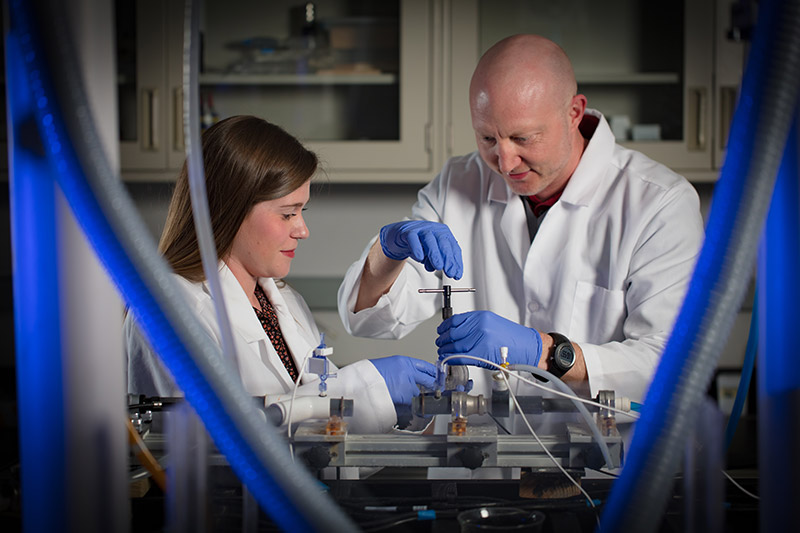Biomedical Engineering
Undergraduate Degrees Available: Bachelor of Science in Biomedical Engineering
Undergraduate Programs
Biomedical engineering encompasses the creation, design, and operation, of processes / technology related to the broad field of human healthcare. The profession traditionally has focused on applications related to the development of instrumentation and diagnostic equipment, discovery of novel treatment options, production of new therapeutics, and the elucidation of underlying biophysical phenomena. Newer applications of bioengineering take advantage of the ever deepening understanding of human physiology and molecular genetics, as related to prevention, detection, and treatment of medical conditions.
Why Choose this Degree
Within three to five years of graduation, graduates of the University of Arkansas undergraduate program in biomedical engineering will be capable of:
- Succeeding in practice at the interface between life science and engineering, or in other professional activities, or in post-baccalaureate studies
- Utilizing their engineering education/experience in creating new knowledge or enabling technologies for improvement of human health and healthcare
- Conducting themselves with high standards of professional ethics and integrity
- Being aware of the limits of their knowledge and initiate self-directed learning to create future professional opportunities for themselves in biomedical engineering
"The faculty are terrific...Dr. Timothy Muldoon has been a great adviser. Under his direction, I've become a better technical science writer and have gained the confidence to individually pursue research leads."
Gage GreeningCourses
Program Educational Objectives
Biomedical engineering encompasses the creation, design, and operation, of processes / technology related to the broad field of human healthcare. The profession traditionally has focused on applications related to the development of instrumentation and diagnostic equipment, discovery of novel treatment options, production of new therapeutics, and the elucidation of underlying biophysical phenomena. Newer applications of bioengineering take advantage of the ever deepening understanding of human physiology and molecular genetics, as related to prevention, detection, and treatment of medical conditions.
Within three to five years of graduation, graduates of the University of Arkansas undergraduate program in biomedical engineering will be capable of:
- Succeeding in practice at the interface between life science and engineering, or in other professional activities, or in post-baccalaureate studies, and
- Utilizing their engineering education/experience in creating new knowledge or enabling technologies for improvement of human health and healthcare, and
- Conducting themselves with high standards of professional ethics and integrity, and
- Being aware of the limits of their knowledge and initiate self-directed learning to create future professional opportunities for themselves in biomedical engineering.
ABET Accreditation
The BS degree in Biomedical Engineering is accredited by the Engineering Accreditation Commission of ABET, https://www.abet.org/.
These are the program's student outcomes;
- an ability to identify, formulate, and solve complex engineering problems by applying principles of engineering, science, and mathematics-
- an ability to apply engineering design to produce solutions that meet specified needs with consideration of public health, safety, and welfare, as well as global, cultural, social, environmental, and economic factors
- an ability to communicate effectively with a range of audiences
- an ability to recognize ethical and professional responsibilities in engineering situations and make informed judgments, which must consider the impact of engineering solutions in global, economic, environmental, and societal contexts
- an ability to function effectively on a team whose members together provide leadership, create a collaborative and inclusive environment, establish goals, plan tasks, and meet objectives
- an ability to develop and conduct appropriate experimentation, analyze and interpret data, and use engineering judgment to draw conclusions
- an ability to acquire and apply new knowledge as needed, using appropriate learning strategies.
These educational outcomes are experienced within the context of biology and physiology appropriate to solving problems at the interface of engineering and biology.

Research Experience for Undergraduates (REU)
Students will be partnered with Biomedical Engineering faculty to perform research in diverse areas of biomedical optics, imaging, genome engineering, and metabolism, including the following areas:
- Live cell metabolic imaging
- Endoscopic imaging and spectroscopy
- Cell and tissue engineering
- Genome engineering
Additional activities include social events with students on campus from other REU programs, a lecture series on responsible conduct in research and ethics, grant writing, manuscript writing, and presentation skills.